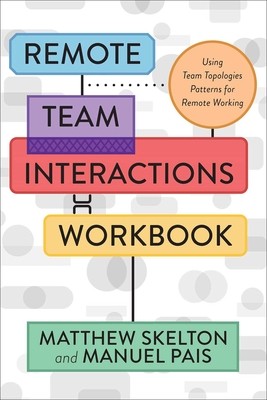
- We will send in 10–14 business days.
- Author: Matthew Skelton
- Publisher: IT Revolution Press
- ISBN-10: 1950508617
- ISBN-13: 9781950508617
- Format: 14.7 x 22.4 x 0.5 cm, minkšti viršeliai
- Language: English
- SAVE -10% with code: EXTRA
Reviews
Description
In the new remote-first and hybrid workplace, many organizations are struggling to catch up with new tooling and ways of working. Many are discovering for the first time that the physical office was covering up poorly defined teams and poorly defined areas of focus, threatening their DevOps transformation efforts and the overall health and success of their business. Matthew Skelton and Manuel Pais, coauthors of the highly successful Team Topologies, provide proven patterns for a successful remote-first approach to teams. Using simple tools for dependency tracking and patterns from Team Topologies, such as the Team API, organizations will find that well-defined team interactions are key to effective IT delivery in the remote-first world. This workbook explores several aspects of team-first remote work, including: How the new "remote-first" world is highlighting existing poor team interactions within organizations.Why organizations should use the Team API pattern to define and communicate the focus of teams.How organizations can track and remove team-level dependencies.How and why organizations should design inter-team communications consciously.How and why organizations can use the three team interaction modes from Team Topologies (collaboration, x-as-a-service, and facilitating) to help. The ideas and patterns presented here will help your organization become more effective with a team-based, remote-first approach to building and running software systems.
- Author: Matthew Skelton
- Publisher: IT Revolution Press
- ISBN-10: 1950508617
- ISBN-13: 9781950508617
- Format: 14.7 x 22.4 x 0.5 cm, minkšti viršeliai
- Language: English English
In the new remote-first and hybrid workplace, many organizations are struggling to catch up with new tooling and ways of working. Many are discovering for the first time that the physical office was covering up poorly defined teams and poorly defined areas of focus, threatening their DevOps transformation efforts and the overall health and success of their business. Matthew Skelton and Manuel Pais, coauthors of the highly successful Team Topologies, provide proven patterns for a successful remote-first approach to teams. Using simple tools for dependency tracking and patterns from Team Topologies, such as the Team API, organizations will find that well-defined team interactions are key to effective IT delivery in the remote-first world. This workbook explores several aspects of team-first remote work, including: How the new "remote-first" world is highlighting existing poor team interactions within organizations.Why organizations should use the Team API pattern to define and communicate the focus of teams.How organizations can track and remove team-level dependencies.How and why organizations should design inter-team communications consciously.How and why organizations can use the three team interaction modes from Team Topologies (collaboration, x-as-a-service, and facilitating) to help. The ideas and patterns presented here will help your organization become more effective with a team-based, remote-first approach to building and running software systems.


Reviews